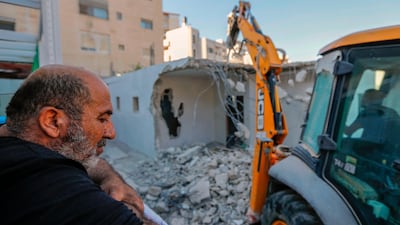Palestinian Alaa Borqan preferred to tear down his own house in Israeli-annexed East Jerusalem after a court ruled that it was constructed illegally and must be demolished.
Mr Borqan, 35, was given two options: to destroy his four-bedroom home in the Jabal Mukaber neighbourhood himself, or to let the city council do it and then send him the bill.
The Israeli authorities regularly raze homes built by Palestinians on their own lands in East Jerusalem and the occupied West Bank if they lack Israeli construction permits.
The catch, according to an UN study, is that such permits are incredibly difficult to obtain and the result is a chronic housing shortage.
"I applied to city hall for a building permit, but without success," Mr Borqan said.
"I spent around 75,000 shekels (Dh82,000) on legal fees and on a ground survey," he said.
Ben Avrahami, an adviser to the city authorities on East Jerusalem, said every case was handled strictly according to the law.
"The demolitions are being carried out by order of an Israeli court and are subject to careful legal scrutiny," he said.
But Mr Borqan, a father of four, said he was dismayed after he hired a bulldozer that was used to tear down his own house in front of his eyes.
He said he invested all of his savings in the building, taking on a debt of 800,000 shekels and putting in four years of work.
The court, which ruled the structure illegal because it was built without a permit, also fined him 60,000 shekels.
He now lives with his family in a house he rents for 2,800 shekels a month.
Standing in the rubble of his former house, he said it was "difficult it is to demolish a home with one's own hands".
According to city hall, 44 houses have been demolished in East Jerusalem since the start of this year.
Some owners prefer to raze their homes themselves to avoid paying thousands of shekels to the city's demolition crews.
East Jerusalem, under Israeli occupation since the 1967 Arab-Israeli War, is home to about 300,000 Palestinians and 200,000 settlers.
Palestinians say the true purpose of the permit regime is to empty the city of its Palestinian inhabitants.
The UN Office for Humanitarian Affairs noted in an April 2019 report that in East Jerusalem "a restrictive planning regime applied by Israel makes it virtually impossible for Palestinians to obtain building permits".
"At least one third of all Palestinian homes in East Jerusalem lack an Israeli-issued building permit, potentially placing over 100,000 residents at risk of displacement," it said.
The authority said that only 13 per cent of East Jerusalem was designated for Palestinian construction, much of which is already built up, while 35 per cent has been allocated to Israeli settlements, which are illegal under international law.
Director of the Jerusalem Centre for Economic and Social Rights, Ziad Hammuri, said the self-demolitions were humiliating and "have considerable psychological effects" on families, in addition to heavy financial costs.
But many Palestinians still prefer to demolish their properties, fearing arrest if they are unable to pay the city's demolition bill or fines.
On July 2, the Shalalda family demolished their two-bedroom apartment in A-Tur.
Sara Shalalda, a mother of six, said it was "very difficult, a dream has been destroyed".
"We were about to move in, we didn't want to have to pay rent any more," she said.
According to the UN Office for Humanitarian Affairs, 65 children were displaced and 85 others affected by self-demolitions in East Jerusalem in the first six months of the year.
Palestinians lack 30,000 to 40,000 housing units, rents are high and building permits are expensive, Union for Jerusalem Housing chief Mahmoud Zahaykeh said.
"The average rent is $800 (Dh2,900) and a building permit for an apartment can cost $50,000," he said.
"Only 20 per cent of residents obtain permits and the process can take five years."
Mr Avrahami said the city granted about 250 building permits to Palestinians each year.
Mr Borqan said he wanted to be among the lucky ones, but his hopes were dashed.
"They don't want us to stay," he said, referring to Israel.
"But we are not going to move."

